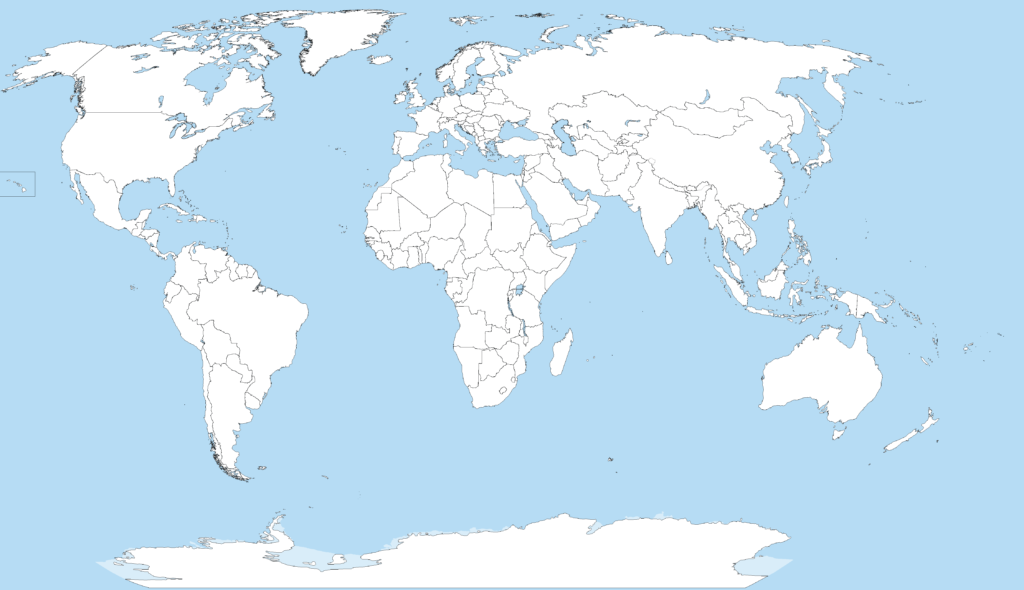Viral videos of Americans failing to answer the simplest geography questions, eliciting laughter and criticisms from viewers both domestic and international, have been gaining in popularity as of late. While it’s a generalization to say that Americans don’t know anything about the outside world, geography education in the United States is indeed lacking.
The question of whether the average American has a working knowledge of geography is important to consider because they are the ones voting on the country’s foreign policy. An understanding of geopolitical topics such as global politics, wars and world history relies on a strong foundation of geography.
“It’s good to know roughly what’s going on in the world around us, and part of that is geography,” said Rowan Clark, a sophomore.
While stereotypes are never fully accurate, only a quarter of students in the United States have a proficient understanding of geography according to the National Assessment of Educational Progress in 2014. This has not changed in recent years.
“We’re especially uneducated about world geography because of our America-centered culture,” said Clark.
In European schools, geography is generally considered much more important. Countries such as France and Norway require students to take geography classes until graduation. In comparison, American students place second to last above Mexico in international testing competitions, according to National Geographic.
Additionally, there are only 10 states that require geography courses to graduate high school, demonstrating that geography education is not prioritized in American school systems. Not all students take issue with the lack of geography in school, however.
“I don’t think [geography’s] totally essential,” said Wren Alger, a freshman. “I don’t know if that’s just a universal thing. Do people in Europe know geography down pat? I’m not sure.”
There isn’t a consensus on the importance of geography among American teachers either, and what the study of that subject should entail. Many schools choose not to educate students in geography entirely because of other priorities.
“If we do have a comprehensive geography program, something’s got to give,” said Joanne Kim, the Head of High School. “The EH program and the faculty associated with the EH program are really interested in reflecting on the work we are doing [to ensure that there is] a better balancing of those tradeoffs.”
Many students at NWA do however feel that geography could be made a greater focus.
“In public middle school I learned nothing whatsoever,” said Lila Satori, a sophomore. “I would like to return to [geography] so I can better understand our world.”
Without geographic literacy, understanding of modern geopolitical events such as urbanization, human migration and international trade is severely impeded. Knowledge of geography also forms the basis for understanding contemporary and historical economic and military conflicts.
“I think schools should work to include more non-American geography material into their curricula,” said Evan Gray-Williams, a junior. “[They should] ensure that [this] information is placed within a sociocultural framework.”
Lack of geographic knowledge can have real world consequences once students become voters but don’t have all the information necessary to choose between policies. For instance, according to National Geographic, after 9/11, Americans scored the lowest percentage of all countries measured on a question that asked them to identify the base of the Taliban and Al Qaeda.
“I think that schools should teach more about geography outside of the United States,” said Jack LaBar, a sophomore. “Sometimes America feels like it’s in its own little geographic bubble.”
Many schools focus primarily on US geography at the cost of international geography, leaving students with significant gaps in their knowledge, and a warped awareness of cultural differences across the world.
Kim agreed, saying that without a global perspective: “you are missing out on the richness of the human experience.”
Additionally, consumers of media can have trouble evaluating the quality of the news, television etc. they engage with unless they have high geographic literacy. Education in this area can improve critical thinking and cultural awareness.
“As I get more exposed to different cultures and places of history, the sheer amount of misinformation in media is staggeringly highlighted,” said Owen Abrahams, a sophomore.
Solutions to the problem of poor geographic education could be quite simple, though they all require lobbying government education boards and creating public awareness.
“[High schools should] actually have geography as a mandatory class,” said Abrahams.
Beyond early schooling, many students have not had any geography education at all.
“Geography should definitely be taught past elementary school,” said Sid Muralidaran, a sophomore who plays geography skill games in his free time.
Digitization of maps and navigation has also made geography and maps incredibly accessible. Online geography quiz games such as Worldle (based on the popular “Wordle”) have become widespread, and Google Maps has features that allow users to explore cities at street level.
“I think the fact that these games are so accessible and easy makes geography less tedious,” said Muralidaran. “[Now] I can actually use my geography skills to view the world.”
Photo is licensed under CC BY-SA 3.0





I enjoyed reading the different perspectives in this article. I do agree that Geography should be taught past the current elementary school level, but if it is then something else might have to give…and if that happens, what is more important? If a teen is getting ready for college and career, maybe Geography falls by the wayside because they can’t do the reading, writing, and math that they will need out in ‘the real world’.
We’d be interested in hearing which 10 states require geography.